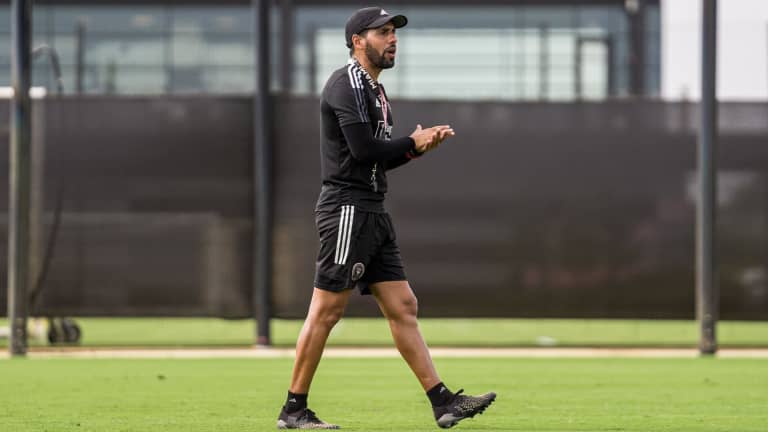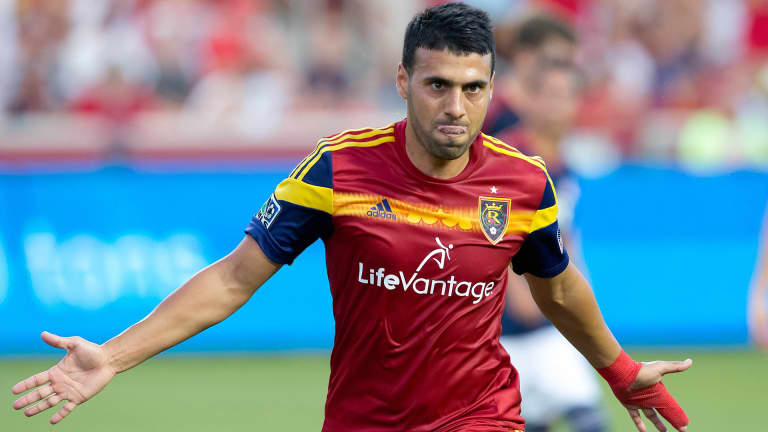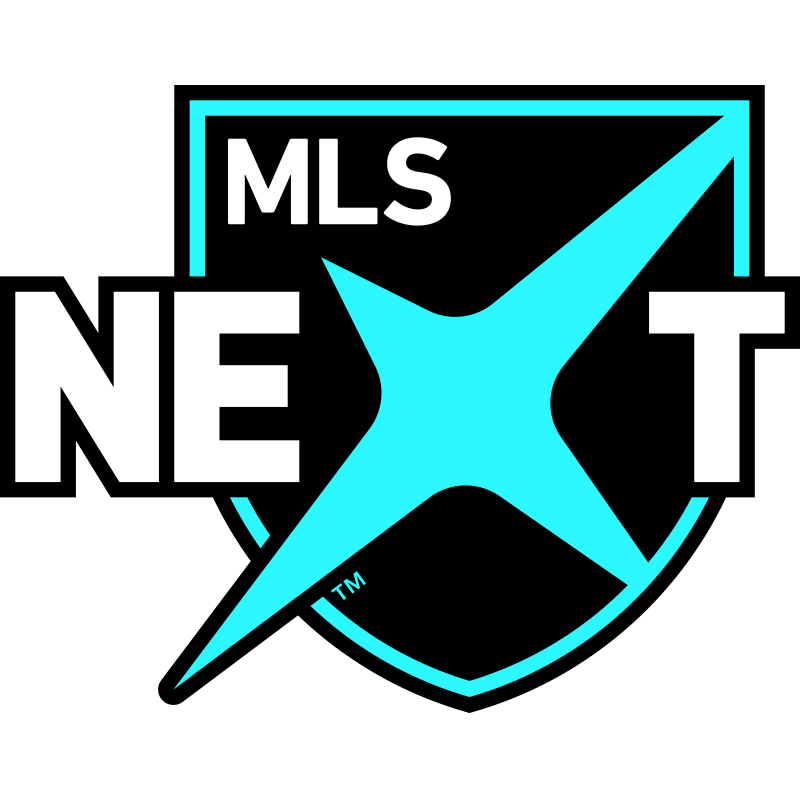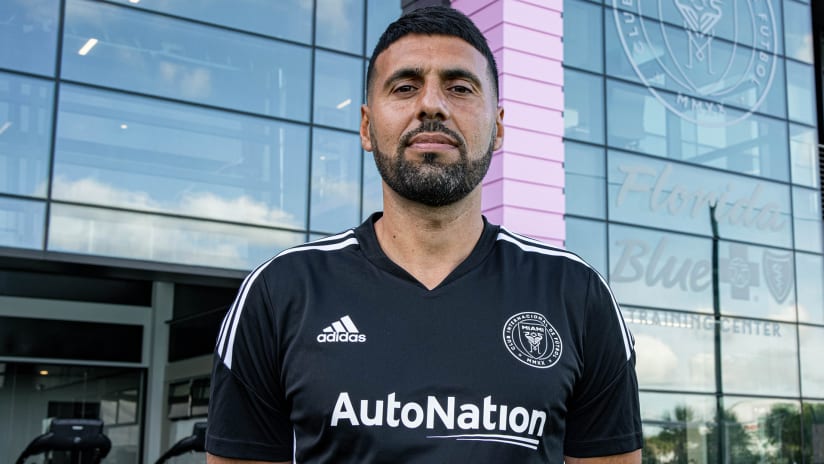EDITOR'S NOTE: Javier Morales, on June 1, was elevated to Inter Miami CF interim head coach after the club parted ways with Phil Neville.
As a player, Javier Morales had the world at his feet. The gold standard in MLS playmakers for the better part of a decade, he was a two-time All-Star and key member of the Real Salt Lake sides that won the 2009 MLS Cup and reached the finals of the 2011 Concacaf Champions League and 2013 MLS Cup.
He experienced a whole new reality when he retired and became an academy coach in 2018.
“The biggest difference in an academy and in a professional environment is, in an academy, it’s only you,” Morales explained in a recent one-on-one conversation with MLSsoccer.com. “You have to do everything. You are the video analyst, sometimes you are a father, sometimes a psychologist, sometimes fitness coach, sometimes equipment manager – you do everything, you know?
“At the beginning it was tough. But this challenge, it's helped me a lot, to grow, not just as a coach, also as a person, to value different jobs.”
Morales started his coaching career at FC Dallas with their Under-13 team, then moved on to Inter Miami CF’s academy in 2019, helping build that club from the ground up as one of their first employees.
“In the beginning, we started to work in Coral Gables and there was Jorge [Mas, IMCF’s co-owner], his son, a few coaches from the academy – we built a team,” he recalled of the club’s early days.
“That was also another experience for me, working six months in an office. Because there wasn’t a field, there wasn’t teams, so we had to do all the scouting, we had to do all the connections, a lot of hours working on Excel on the computer, filling out names. That was really helpful for me.”
Inter Miami rise
The Herons’ youth system has been promising in its brief existence. Miami’s U-15s won the 2022 MLS NEXT Cup – with Javier’s son Santiago pulling the strings en route to the age bracket’s Golden Ball award – and several academy prospects have already signed homegrown contracts, among them Benjamin Cremaschi, 18, a dual-national talent who’s been called up by both the US and Argentine youth national teams.
Morales was at the forefront as IMCF introduced themselves to the teeming South Florida youth soccer scene, working to build credibility in a ferociously competitive landscape marked by well-established powers like Weston FC and Miami Rush Kendall SC.
“Especially here in south Florida, you have a lot of Latin culture, where soccer is almost life, and they want to compete all the time,” he said. “It was tough to recruit, to scout players, because in the beginning, nobody trusts Inter Miami. So now after three years and a half, the relationship between the club and the local teams is getting better.
“It's normal. Imagine that you are in South Florida for the last 20 years, and you worked really hard and you have a good club and you have good players, good environment. And then Inter Miami arrive and say, ‘OK, they're going to take your best players with us,’” he added. “This is not easy, right? Also, we need to understand this side and try to create a relationship that we’re not trying to ‘steal’ players from you, we’re trying to help those players to develop and became a pro one day.”

Building partnerships has been crucial for Miami, who – despite the caché fueled by superstar part-owner David Beckham and the city’s global appeal – are keen to cultivate a pipeline for the best young players in their dazzlingly diverse region to graduate into their first team. Their status at the top of the local soccer food chain also makes them the team neighboring clubs hunger to beat, and that’s just fine with Morales.
“Those local teams, when they play against us, they're going to play the best game ever. And they want to try to win and they're going to celebrate, and that is part of the process,” he noted. “Players from Inter Miami, they need to understand that everywhere where they go and play, there is going to be people that want to take their spots. And that is part of the competition, is part of the pro environment.
“To be honest, I like it that way,” he added. “I like better this way because that creates a culture, not just for us also for the community.”
Over the winter Morales ascended from the academy to Phil Neville’s first-team staff, a significant step forward in a coaching journey that was already taking shape in his RSL salad days, when he was starring on teams led by Jason Kreis, the coach who is now his IMCF colleague.
“My coach here was Jason Kreis, and he brought me here to this country, and I always was talking about tactics. That was a passion for me, to understand the game and ask questions: why, why, why?” said Morales. “Not because I’m in a bad way, but because I wanted to learn. When I was retired, I was 100% that I wanted to become a coach.”
On the long path to the coaching licenses he holds from both Conmebol and U.S. Soccer, he quickly learned that playing the game and coaching it were two very different spheres.
“I had a lot of ideas in my brain, in my head, but it's tough to put it in place,” he explained. “We believe, most of the players, ex-pros believe, that because you play the game, you know the game. And in my opinion, I wanted to take a different way, like, the toughest one. I was working in the academy, and I was doing, like, I don't know, picking up stuff from the field, talking with parents, talking with families, being a fitness coach, different things that gave me a lot of tools.
“In the beginning was tough. But after a while, I started to feel that was the right decision. Because now, after four years that I started this profession, I can sit with Phil, with Jason, in the room and I feel that I have the tools, I have the answers. Of course, I still have questions about a lot of things, but the process for me was probably longer than others. But I'm very happy in the decision that I made.”

Opportunity calls
Morales’ trajectory underlines the value of MLS NEXT and MLS NEXT Pro as proving grounds not just for young players, but coaches, referees, administrators and others rising up the ranks. That’s come full circle as he returns to a first-team locker room.
Where once he had to do a bit of everything as an academy coach, now he’s one cog in a large staff with ample resources. Morales painstakingly honed his English skills to earn his coaching badges – “doing those licenses in English, going to spend time with different coaches in different parts of the country, that was really, really powerful for me in my career,” he said – and today he’s a valuable bilingual link between Neville and IMCF’s Spanish-speaking Latino players. And with the nuts and bolts of his second profession in place, he’s now eager to gain a fuller grasp of managing professionals, and MLS intricacies like salary budgets and roster regulations.
For a club that was buffeted in its early years by off-field drama, uneven results and controversies like the severe sanctions handed down in 2021 for violations of MLS roster rules, that’s an encouraging sort of institutional growth. Morales, who once made Salt Lake into a small-market powerhouse against the odds, aims to be part of that push towards something with real staying power.
“I’m going to say the word consistency,” he said. “Because if you see Inter Miami in the last three years, a lot of up and down, a lot of things going on, and we didn't have any consistency. Last year we finished the year strong, and now that should be the bottom, the standard. But now we have to go higher, we have to look for something different.
“First year was pandemic, the second year all those problems that we all know, and the third year was the adaptation to those restrictions. And now, OK, the storm happened, so now we need to start to move forward.”













